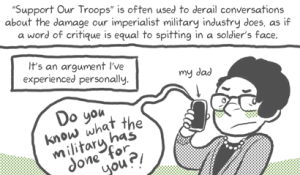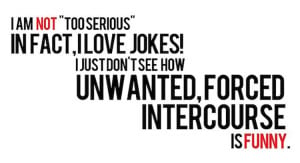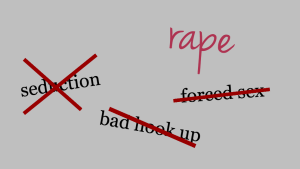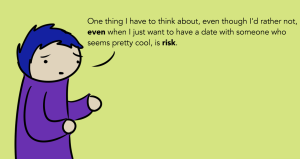Originally published at The Establishment and republished here with permission.
(Content Note: mentions of sexual and emotional violence)

A couple standing close together. One of them wears a fedora and stares ahead proudly; the other smiles with a hand raised near their cheek.
I knew my relationship was doomed when we got into a feud about Kevin James.
“I don’t like him,” I told my new boyfriend Liam*, a professional comedian. “I don’t think he’s funny.”
I could have left it at that, but I didn’t: “And also, I think it’s a sign of cultural misogyny that he gets paired with beautiful women in movies, and we never see similarly schlubby women with conventionally hot men.”
We were holding hands as we walked down a snowy street in my neighborhood, and I felt Liam’s hand stiffen.
“Hate to break it to you, babe, but a movie like that wouldn’t sell,” he scoffed. “It’s a wish-fulfillment thing. Guys want to see a movie where an average dude gets a hot chick, so they can believe the same thing might happen to them.”
My eyebrows have never shot up that fast in my life.
“You don’t think women want to see our wishes fulfilled in movies, too?” I asked. “You don’t think women have money and will spend it on movies that depict women well?”
I wanted, so badly, to give him the benefit of the doubt. I wanted him to cede that Hollywood’s misogyny is a bad thing, or even a real thing. But he didn’t acknowledge any of that.
“I’m telling you, it wouldn’t sell,” he replied, with the finality of someone who thinks he’s had the last word. He kept walking and holding my hand, like nothing had changed.
Struggling to keep my voice even, I told him, “If you don’t see gender injustice in the world, it’s because you’re a straight, white, able-bodied, cis dude, and you’re unaware of those things because of your privilege.”
“Oh, here we go,” he snapped, his veneer of cool condescension bending at last. “Men aren’t more privileged than women. Different people have different levels of privilege depending on what’s going on in their lives. For example, in divorce courts—”
That’s when I let go of his hand. Actually, it would be more accurate to say that I threw his hand away from me like it was a rotting rat corpse I’d found behind the couch.
“Nope,” I barked. “I can’t have this conversation with you. I’m going to get too mad at you, and we are going to break up if we have this conversation.”
That night, I went home and texted my four closest friends: three ardently feminist women and one dude who I considered a pretty solid ally. “Do I have to break up with him?” I implored after explaining the situation. All three women immediately blew up my phone with all-caps yeses. But the man gave me pause.
“At Liam’s age, I definitely wasn’t ‘woke,’” he told me. “If you otherwise like him, maybe it would be worth putting in the work to teach him about privilege and oppression.”
I did break up with Liam, though it took me another month of waffling. He was a passably nice boy I’d met on Tinder – smart, funny, creative, interesting, and a terrific cuddler. I’d assumed he was a feminist because, in my mind, any good and decent man would be.
My experiences up until then had mostly confirmed this. But in Liam’s case, being a good and decent man wasn’t enough, if he didn’t also believe in the systemic struggles women face. I saw this the day Jian Ghomeshi was acquitted of the sexual assault and choking he had (in my opinion, at least) certainly committed.
As the women on my Twitter feed raged, ruminated, and rallied together, I wanted to cry on my partner’s shoulder about the world’s cruelty toward women. But I couldn’t, because I knew he wouldn’t understand. Or worse: He’d tell me I was overreacting.
I realized that emotional support from a partner didn’t mean anything to me if it was incomplete – and part of supporting a woman is believing her when she talks about the injustices women face, and being appropriately angry on her behalf.
When I broke up with Liam, I blamed “differences that can’t be solved.” I thought he might ask for clarification, but he didn’t. It was clear to both of us that despite compatibility in other areas, our political disagreements were untenable – especially since, to me, as a woman, feminism is more than a political issue.
It is my lived experience, my daily struggle, my lifelong fight. As a woman who writes about gender issues on the Internet, misogynistic trolls show up uninvited in my life every day; I don’t need them in my chosen intimate relationships, too.
In the wake of this break-up, I promised myself I would never again get seriously involved with any non-feminists. I wouldn’t settle for bullshit excuses like “He has feminist beliefs, he just doesn’t call himself a feminist” or “He doesn’t consider himself a feminist, but he’s still a good person.”
For a man to earn the “boyfriend” label with me, he would first have to wear the “feminist” label.
But even this, I soon learned, wasn’t enough.
***
Less than a week after I cut ties with Liam, my friend Tom* – the same guy I’d asked for advice about my unfeminist boyfriend – was accused of having sexually and emotionally abused one of his ex-girlfriends.
At first, I didn’t believe the “rumors” (he always used the word “rumors” when he spoke to me about them, never “accusations” or “concerns” or any other word implying validity). Tom was my friend, and a former fuckbuddy. We’d engaged in everything from vanilla sex to intense kink together, and he’d always dutifully checked in and made sure I was okay every step of the way.
So my loyalty to my friend joined forces with my internalized misogyny, and I initially assumed the anonymous complainant must be making it up, or blowing an encounter out of proportion. How could my consent-conscious, feminist former fuckpal be an abuser?
But then two more women emerged from Tom’s past to say publicly that they, too, were his victims. As their stories popped up in private online correspondence and whispered conversations at parties, I reached out to them and compared notes.
He’d used his sex-positive feminist rhetoric to win their trust. He’d gradually razed their self-esteem with small, barbed body-shaming comments. He’d coerced verbal consent from them to perform sexual acts they didn’t want, because feminist doctrine says you need a “yes” or it’s rape.
He’d isolated them from their social spheres by telling them he worried about their safety because other men were dangerous. And all the while, he’d gaslit them into thinking this was all normal, by shrouding his every word, his every move, in a veil of feminist theory.
Though I’d escaped some of these abuses simply by virtue of being a casual partner and not a romantic one, my conversations with Tom’s exes helped me reflect on my encounters with him and see that he had, indeed, manipulated me.
He’d overstepped my stated boundaries, repeatedly claiming he “forgot” I didn’t like to be choked or to have my nipples twisted, even after I’d explained this to him several times.
He’d shamed my body, calling my vaginal fluids “gloopy” during sex with a grossed-out grimace on his face, and even wiping my vulva off with a tissue without asking, like I was a baby. And he’d told me lies, claiming to have been mistreated by his ex when actually he was the abusive one.
His feminist bombast outside of the bedroom convinced me his violations must merely have been mistakes. When I realized the truth, I deleted and blocked him across all my social media.
I stopped answering questions about him with excuses and rationalizations (“I think he’s really a good guy, though!”) and started saying: “He’s an abuser. He is not a feminist. Not by a long shot.”
These two back-to-back revelations, about a non-feminist and a fake feminist, made me realize it’s worse for a man to falsely claim feminist beliefs than it is for him to not be a feminist at all. In a choice between these two evils, I’ll choose the one who’s more honest.
In his groundbreaking book about abuser psychology, Why Does He Do That?, domestic abuse counselor Lundy Bancroft talks about an archetype he calls “Mr. Sensitive.” This archetypal abuser “presents himself to women as an ally in the struggle against sex-role limitations” and “speaks the language of popular psychology and introspection.”
In other words, he uses the jargon of liberal, pro-women social movements – such as, in Tom’s case, sex-positive feminism – to pacify his victims and make them seem “crazy” if they accuse him of abuse.
Who, after all, would ever suspect a soft-spoken, sensitive, “woke” man of psychologically and physically destroying his female partner behind closed doors? Feminist lingo and logic can be used to gaslight unsuspecting women, and this is an incredibly dangerous threat.
My experiences also possessed me with the question: What does it mean for a man to be truly feminist? Is that even possible – or is a man only ever, at best, a feminist ally and a recovering misogynist?
I discussed this with several friends – women, men, and non-binary people alike. There were some common elements in their answers. A feminist man makes space for women to speak and to hold positions of power, even when that means moving away from his own power.
He defends and supports women when they need it, especially in spaces where a man’s voice holds more weight than a woman’s (which, let’s face it, is most spaces). He listens to and believes women, instead of interrupting or interrogating us, when we tell him our experiences and our concerns.
He advocates feminism not just to women, but to men, too, because he recognizes it’s not about winning points, it’s about making change. He unlearns the defensiveness that naturally comes up when we confront our own privilege, and then uses that privilege to do good in the world.
For feminist women, dating men can feel like a lose-lose proposition. Either you settle for someone who invalidates your politics and therefore your personhood, or you gamble on a man who claims to support your cause, but may or may not actually give a shit.
People tell all kinds of lies about themselves when they date. They might add a few inches to their height (or other measurements), twist their job title into something more important-sounding, or rely on flattering angles in all their Tinder photos. It’s all too easy to lie about yourself, including about your sociopolitical beliefs.
“Feminist” isn’t a label, it’s a way of living; a man is only a feminist if he consistently performs feminist acts. This seems obvious enough, but it’s shocking how many men in this world are merely misogynists in feminists’ clothing.
[do_widget id=’text-101′]
Kate is a Canadian twenty-something journalist and blogger who’s written about sex, kink, masturbation, and gender for Maisonneuve, Herizons, the Plaid Zebra, and her blog. She also does sex education, occasionally guest-hosts the discussion show Sex City Radio, and writes dirty songs on her ukulele. Her passion for sex writing, like her sex toy collection, is absurdly large.
Search our 3000+ articles!
Read our articles about:
Our online racial justice training
Used by hundreds of universities, non-profits, and businesses.
Click to learn more




















